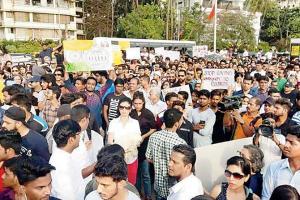On being denied permission to protest, activists find that cops have been misusing a provision that temporarily bans assembly of more than four people to stifle free speech

People protesting against the Kathua and Unnao rapes at Carter Road on April 15
A PIL has been filed in the Bombay High Court against the police's attempt to muzzle freedom of speech and expression by converting a temporary prohibitory order into a norm. The petition cites denial of permission to use loudspeakers during a protest.
ADVERTISEMENT
The protest had been organised by 'India unites for justice against rapes and murder' at Carter Road in Bandra West. To be heard on Thursday, the PIL names the state government and state home department among others as respondents. Lawyer-turned-activist Abha Singh, in her PIL, has raised serious concerns about the manner in which the police have been misusing section 37 (police permission has to be sought for any public gathering of more than four people) of the Bombay Police Act, 1951, wherein they have been issuing a statutory prohibitory order, meant to be enforced only in specific cases to maintain law and order, and that too just for a period of 15 days.

Abha Singh
"Instead, the police have been resorting to issuing a prohibitory order every 15 days, the very minute the preceding one expires. In this way, a temporary measure in an extraordinary situation is made into a permanent one in an ordinary situation," she fumed. Singh also claimed that such an order can remain in force without the state's sanction for not more than 15 days, but no permission is ever sought from the government for the multiple renewals.
The trigger
According to Singh, on April 15, at Carter Road and a fortnight later at Marine Drive, protesters were deprived of their fundamental right to hold a gathering to condemn the Kathua and Unnao rapes. To raise their voice over the institutional failure in handling the cases and delivering justice, various women's rights organisations, lawyers and Mumbaikars had sought permission from the Khar police but were disallowed from using microphones or loudspeakers.

Abha Singh who was among those protesting against the Kathua and Unnao rapes on April 15 at Carter Road in Bandra West
A letter, dated April 13, given to the Khar police, however, stated: "The protest will be ...peaceful... and no kind of anti-social elements or violence will be entertained. A crowd of 50 people is expected... and no loudspeakers will be used during the course of the protest." When asked about this, Singh clarified, "The Khar police forced us to write this letter; if we hadn't, they wouldn't have given us permission to even hold the gathering." The protest at Marine Drive met the same fate, i.e. it was muted.
"The spirit of the protest was killed; therefore, I have moved a writ petition before the HC. We demand that this draconian section 37 be struck down, as it violates Article 19 of the Constitution," she added.
During British Raj
"It is submitted that such a trampling of the fundamental rights of the person was not even prevalent during the British time. In fact, the Indian Police Act, 1861, which was made applicable in 1861, had no such provision as has been impugned herein. The only provision to restrict freedom of speech and assembly made during the British Rule was: a) to regulate the processions on public streets, and b) by the issuance of temporary orders under section 144 of the Code of Criminal Procedure, 1973," states the PIL.
"The violation of law is exacerbated by the fact that since these are temporary provisions (sec 37) made permanent by violating the law, even the essentials, i.e. rules, have not been made and notified." "The system in the UK even today, with respect to protests and marches, is one that promotes the essentials of fundamental rights; authorities have a limited role... unless it disrupts traffic on streets, for which prior intimation is a must," said Singh.
What the PIL says
As per the petition, the police have an elaborate machinery to prevent and control law and order situations, for example, there are laws specific to sections 107 and 149 of the Code of Criminal Procedure, 1973, to prevent any vulnerable situation. It is for this reason that the legislature, in its wisdom, had enacted the provision only to deal with exceptional situations in exceptional times. "The police have an enormous machinery... Hence, it would not be in the fitness of things to let the executive arm of the government, i.e. the police, go beyond the law to issue the impugned recurrent orders."
Catch up on all the latest Crime, National, International and Hatke news here. Also download the new mid-day Android and iOS apps to get latest updates
 Subscribe today by clicking the link and stay updated with the latest news!" Click here!
Subscribe today by clicking the link and stay updated with the latest news!" Click here!






